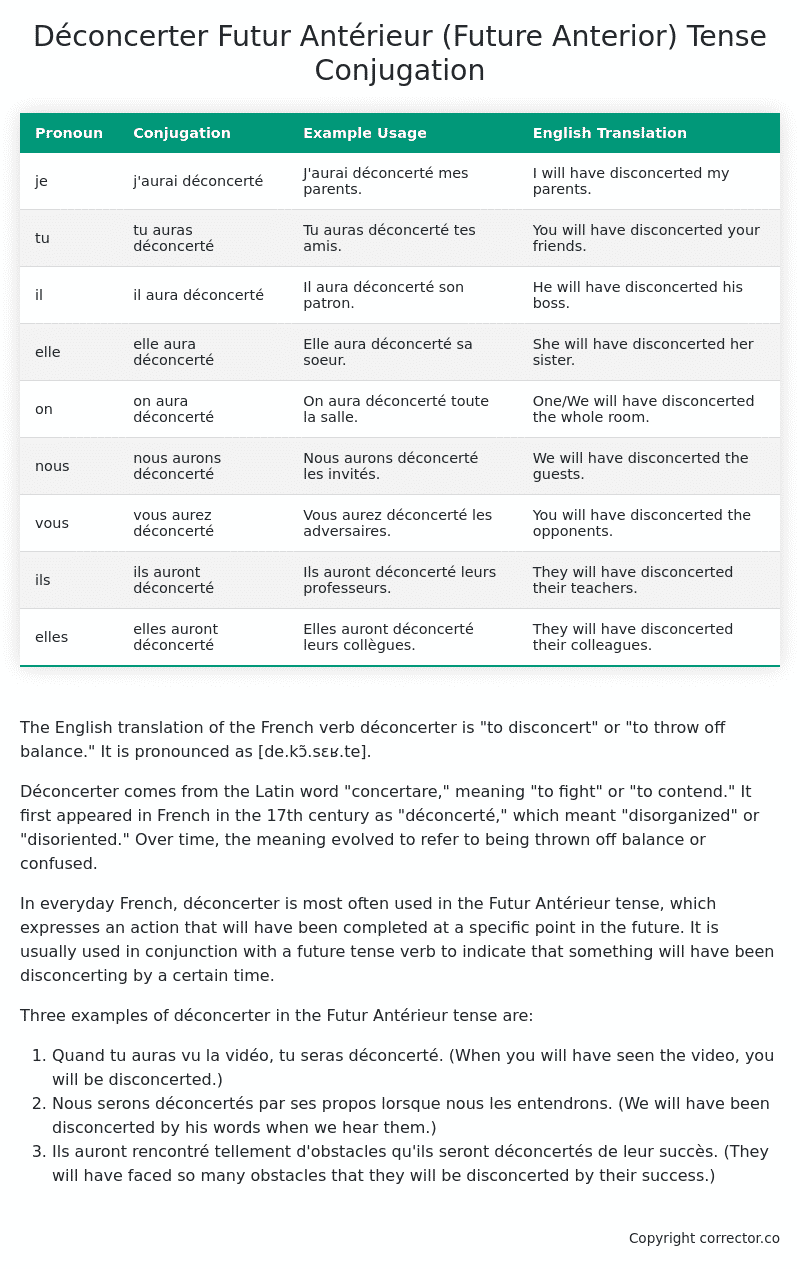Futur Antérieur (Future Anterior) Tense Conjugation of the French Verb déconcerter
Introduction to the verb déconcerter
The English translation of the French verb déconcerter is “to disconcert” or “to throw off balance.” It is pronounced as [de.kɔ̃.sɛʁ.te].
Déconcerter comes from the Latin word “concertare,” meaning “to fight” or “to contend.” It first appeared in French in the 17th century as “déconcerté,” which meant “disorganized” or “disoriented.” Over time, the meaning evolved to refer to being thrown off balance or confused.
In everyday French, déconcerter is most often used in the Futur Antérieur tense, which expresses an action that will have been completed at a specific point in the future. It is usually used in conjunction with a future tense verb to indicate that something will have been disconcerting by a certain time.
Three examples of déconcerter in the Futur Antérieur tense are:
- Quand tu auras vu la vidéo, tu seras déconcerté. (When you will have seen the video, you will be disconcerted.)
- Nous serons déconcertés par ses propos lorsque nous les entendrons. (We will have been disconcerted by his words when we hear them.)
- Ils auront rencontré tellement d’obstacles qu’ils seront déconcertés de leur succès. (They will have faced so many obstacles that they will be disconcerted by their success.)
Table of the Futur Antérieur (Future Anterior) Tense Conjugation of déconcerter
| Pronoun | Conjugation | Example Usage | English Translation |
|---|---|---|---|
| je | j’aurai déconcerté | J’aurai déconcerté mes parents. | I will have disconcerted my parents. |
| tu | tu auras déconcerté | Tu auras déconcerté tes amis. | You will have disconcerted your friends. |
| il | il aura déconcerté | Il aura déconcerté son patron. | He will have disconcerted his boss. |
| elle | elle aura déconcerté | Elle aura déconcerté sa soeur. | She will have disconcerted her sister. |
| on | on aura déconcerté | On aura déconcerté toute la salle. | One/We will have disconcerted the whole room. |
| nous | nous aurons déconcerté | Nous aurons déconcerté les invités. | We will have disconcerted the guests. |
| vous | vous aurez déconcerté | Vous aurez déconcerté les adversaires. | You will have disconcerted the opponents. |
| ils | ils auront déconcerté | Ils auront déconcerté leurs professeurs. | They will have disconcerted their teachers. |
| elles | elles auront déconcerté | Elles auront déconcerté leurs collègues. | They will have disconcerted their colleagues. |
Other Conjugations for Déconcerter.
Le Present (Present Tense) Conjugation of the French Verb déconcerter
Imparfait (Imperfect) Tense Conjugation of the French Verb déconcerter
Passé Simple (Simple Past) Tense Conjugation of the French Verb déconcerter
Passé Composé (Present Perfect) Tense Conjugation of the French Verb déconcerter
Futur Simple (Simple Future) Tense Conjugation of the French Verb déconcerter
Futur Proche (Near Future) Tense Conjugation of the French Verb déconcerter
Plus-que-parfait (Pluperfect) Tense Conjugation of the French Verb déconcerter
Passé Antérieur (Past Anterior) Tense Conjugation of the French Verb déconcerter
Futur Antérieur (Future Anterior) Tense Conjugation of the French Verb déconcerter (this article)
Subjonctif Présent (Subjunctive Present) Tense Conjugation of the French Verb déconcerter
Subjonctif Passé (Subjunctive Past) Tense Conjugation of the French Verb déconcerter
Subjonctif Imparfait (Subjunctive Imperfect) Tense Conjugation of the French Verb déconcerter
Conditionnel Présent (Conditional Present) Tense Conjugation of the French Verb déconcerter
Conditionnel Passé (Conditional Past) Tense Conjugation of the French Verb déconcerter
L’impératif Présent (Imperative Present) Tense Conjugation of the French Verb déconcerter
L’infinitif Présent (Infinitive Present) Tense Conjugation of the French Verb déconcerter
Struggling with French verbs or the language in general? Why not use our free French Grammar Checker – no registration required!
Get a FREE Download Study Sheet of this Conjugation 🔥
Simply right click the image below, click “save image” and get your free reference for the déconcerter Futur Antérieur tense conjugation!

Déconcerter – About the French Futur Antérieur (Future Anterior) Tense
Construction
Common Everyday Usage Patterns
Interactions with Other Tenses
For example
Summary
I hope you enjoyed this article on the verb déconcerter. Still in a learning mood? Check out another TOTALLY random French verb conjugation!


